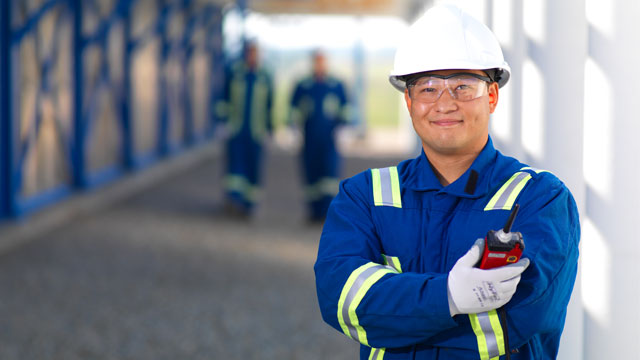Health & Safety
Health & Safety is our number one value. Today, and always.
As we enter the final year of construction in 2023, our first priority continues to be the health and safety of our workforce and their families, as well as our Indigenous partners and local communities along the project route.
Our commitment to safety isn’t just a mantra – it’s how we work 24/7, 365 days of the year across our entire organization. If it isn’t safe, we won’t do it. By reinforcing a disciplined set of rules and providing rigorous training, Coastal GasLink is proud to have reached our final year of construction with a strong safety record.
Safety Operations
Our safety performance and reliability influences your trust in us. We're committed to keeping you safe.
Coastal GasLink will be monitored around the clock. This means 24 hours a day, seven days a week, 365 days a year with satellite technology, aerial inspections, internal monitoring and more.
Read more about Safety on our FAQ page
Our commitment to safety
With over 65 years of experience building and operating pipelines, TC Energy uses only the best materials and safety practices. From design and construction to operation and maintenance, we are committed to keeping Coastal GasLink and your communities safe.
Quality design
- We use high-quality steel and welding techniques, also applying a corrosion-resistant coating to the pipeline.
- Additional precautions are taken when crossing a road or under waterways; precautions include using thicker-walled pipe and burying the pipeline deeper in areas of higher population.
Ongoing maintenance and assessments
- An electronic tool called a smart PIG (pipeline inspection gauge) travels through the pipeline to evaluate its internal condition.
- A low-voltage electrical current called cathodic protection is applied to the pipe for protection from corrosion.
Your safety role
The biggest risk to a pipeline is when a landowner or a contractor conducts unauthorize activity or excavation on the right-of-way..
Careful construction
- The proposed pipeline will be underground except at valve sites and compressor stations.
- All pipeline welds are inspected with ultrasonic inspection technology, in addition to using standard x-ray inspection tools.
- Before it’s operating, the integrity of the pipeline is tested beyond its maximum operating pressure.
Around the clock monitoring
- Before the pipeline begins operating, the pipeline is filled with water pressurized to a level that exceeds the operating pressure of the pipeline, ensuring that it’s ready to transition safely to operation.
- The pipeline is monitored 24 hours a day, 365 days a year. With satellite technology, sensors within the pipeline send data every five seconds to our state-of-the-art control centre. If low gas pressure is detected, the valves on the affected section close automatically and are evaluated by our team of highly trained professionals, assessing next steps.
- Staff and contractors are trained to know exactly what to do in the unlikely event of an emergency. We conduct regular exercises and collaborate with local emergency responders to ensure there is a coordinated response.

Quick fact
Pipelines are the safest method to transport natural gas across long distances. Electronic in-line inspection devices, known as "smart PIGS", are periodically used on sections of the pipeline system to detect potential defects.
Emergency Response
Preparing and responding to an emergency
Pipelines like Coastal GasLink are the safest method to transport natural gas over considerable distances. While we take every possible safety precaution, we also must be prepared to respond if there’s an incident on our pipeline. With an industry-leading safety record and over 65 years of experience, TC Energy conducts regular emergency drills with local responders to prepare for the unlikely event of an emergency. In 2018, 196 emergency drills were conducted to ensure we always have a coordinated and collaborative response.
The process used at TC Energy for emergency response is the “Incident Command System (ICS)”. This allows for a unified command approach, where TC Energy works with federal, provincial, local and aboriginal authorities to develop common objectives and action plans to address the emergency.
Coastal GasLink has prepared a comprehensive Emergency Response Plan that outlines procedures to protect the public, emergency responders, property and the environment in the unlikely event of an emergency. Detailed analysis of emergency response scenarios also helps us determine where to locate resources so that we can respond as quickly and effectively as possible.
In addition, our prime contractors will be required to submit safety plans that address emergency procedures aligned with our health and safety expectations. And, our prime contractors may undertake their own emergency exercises or simulation during construction.
Learn how TC Energy safely constructs pipelines